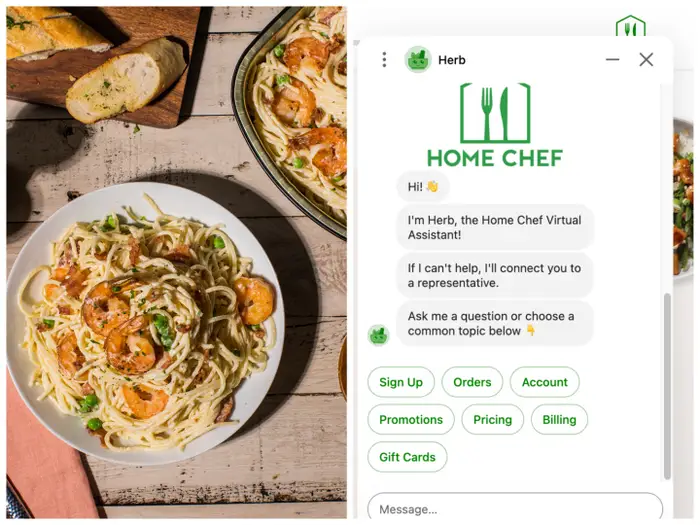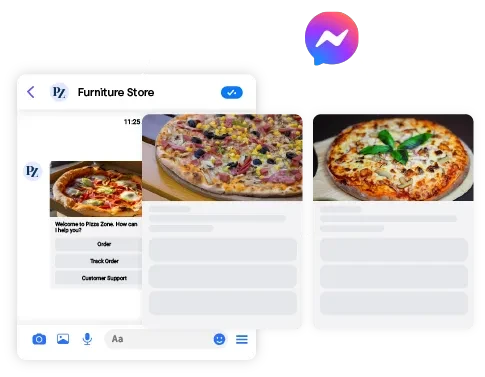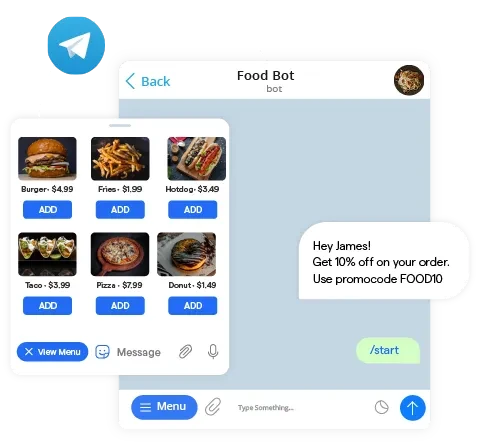In the last year, thanks to tech, smartphones, and the pandemic, how we order food has totally changed. People love ordering online now, but they still miss that cool feeling of dining out. So, restaurants really need to make online ordering feel just as awesome as eating in.
Gone are the days of tedious phone calls, misunderstood orders, and frustrating wait times. The emergence of Conversational AI has ushered in a seamless and efficient ordering experience.
Conversational AI technology empowers businesses to communicate with customers effectively. It suggests menus, processes orders, and addresses requests through chatbots, voice assistants, or apps, simplifying the food ordering process and enhancing overall satisfaction.
According to a recent study by Drift, restaurants that use chatbots can increase their average order value by up to 15%. Chatbots can also help restaurants to reduce their customer support costs by up to 25%.
This blog will define conversational AI in the food industry and discuss the importance of a seamless food ordering experience.
Conversational AI in the Food Industry

Conversational AI enables machines to understand, process, and respond to human language, making high-quality and efficient conversations possible.
In the food industry, it is applied in the form of chatbots integrated into ordering platforms to streamline the ordering process.
Importance of Seamless Food Ordering Experience
With conversational AI rapidly transforming the food industry, a seamless ordering experience is now more important than ever.
Customers today demand quick, efficient, and personalized service.
Using AI-powered chatbots within the ordering process can provide a more streamlined and efficient experience, resulting in higher customer satisfaction and retention.
How Conversational AI Streamlines Food Ordering?
The introduction of conversational AI into the food industry has been a game-changer, as it enables the centralization of all ordering platforms, making the customer experience more efficient.
Centralized Ordering Platform
A centralized ordering platform enables customers to order their meals from multiple restaurants using a single platform, simplifying the ordering process significantly.
AI-powered Chatbots for Instant Assistance

Chatbots are an essential element of conversational AI in the food industry. By integrating chatbots into the ordering process, restaurants can provide customers with real-time assistance, answering questions and processing orders promptly.
An AI-powered chatbot can also help track orders, provide personalized suggestions, and initiate follow-up communication.
And implementing an AI chatbot for your business isn't that tough. Meet BotPenguin- the home of chatbot solutions. With all the heavy work of chatbot development already done for you, deploy AI chatbots for multiple platforms and make multi-channel support look easy for business:
- WhatsApp Chatbot
- Facebook Chatbot
- Wordpress Chatbot
- Telegram Chatbot
- Website Chatbot
- Squarespace Chatbot
- Woocommerce Chatbot
- Instagram Chatbot
Personalized Recommendations and Suggestions
Personalized recommendations and suggestions are at the core of conversational AI in the food industry.
Through data analysis, chatbots can suggest menu items tailored to individual customers' preferences, predict complementing dishes, and make recommendations based on past orders.
Such personalized recommendations cater to individual preferences and increase customer engagement and loyalty.
Benefits of Conversational AI in Food Ordering
Conversational AI has several benefits for food businesses. In this section, we will discuss the most significant benefits.
Enhanced Customer Experience
Conversational AI in food ordering can provide customers with a more seamless and personalized experience.
Chatbots and natural language processing can enable customers to receive prompt and helpful assistance, making the ordering process smoother and more user-friendly.

Increased Order Accuracy and Efficiency
The use of conversational AI can also increase order accuracy and efficiency, reducing order errors and wait times.
Automated AI systems can process orders more quickly and accurately, avoiding manual errors that can lead to dissatisfaction and lost business.
Improved Customer Engagement and Loyalty
Finally, conversational AI can drive customer engagement and loyalty.
A business can establish a deep connection and foster customer loyalty by providing personalized recommendations and easy communication channels for follow-up.
Suggested Reading:
Implementing conversational AI in Food Businesses
Now that we have discussed the benefits of implementing conversational AI in food ordering, it is important to consider how to implement it effectively.
Choosing the Right AI Solution
Choosing the right AI solution is key to implementing conversational AI. The ideal solution should be customizable to meet the specific needs of a business.
Factors to consider should include budget, scalability, and support requirements.
Integration with Existing Systems
Implementation of conversational AI should maintain existing systems.
Ensuring compatibility with existing software and hardware, including point-of-sale systems, order management, and kitchen management systems, is crucial.
Effective integration will ensure a seamless transition to the new system.
Staff Training and Support
Leveraging conversational AI requires adequate training and support for staff. Providing comprehensive training and ongoing support is important to ensure staff can use the new system effectively.
Training can minimize errors and lead to the adoption of AI by the staff.
AI-driven Features for Easy Food Ordering
Several AI-driven features can make food ordering more comfortable for customers. The integration of different AI technologies can lead to a comprehensive ordering experience.
Natural Language Processing for Smooth Interaction
Natural language processing (NLP) can enable chatbots to interpret and respond to human language more accurately and efficiently, making the ordering process smoother.
This technology can also help chatbots understand customer intentions, leading to more personalized recommendations.
Voice Assistants for Hands-free Ordering
Voice assistants can provide a hands-free ordering experience, reducing user friction during the ordering process.
With voice assistants, customers can place orders by simply issuing voice commands, increasing the convenience of ordering.
Visual Recognition for Menu Item Selection
Visual recognition tools can facilitate menu item selection, presenting customers with relevant options.
Visual recognition technology can also enable customers to scan barcodes to access product information and other essential details.
Challenges in Traditional Food Ordering
Despite the rapid digitalization of the food industry, traditional food ordering methods still exist. However, inherent challenges are associated with this traditional method, which interferes with customer satisfaction.
These challenges stem from lengthy and complicated ordering processes often requiring personalized or customized options.
Lengthy and Complicated Ordering Processes
Traditional food ordering processes present several challenges, the most notable being the length and complexity of the ordering process.
This process typically involves multiple steps, such as printing menus, dialing a phone number, and waiting on hold.
This process often results in frustrated customers and lost business.
Limited Personalization and Customization Options
Another challenge of traditional food ordering is the need for more personalization and customization options.
These options can play a significant role in customer satisfaction.
But are often difficult to implement with traditional methods, resulting in a one-size-fits-all solution that fails to cater to individual preferences.
Addressing Concerns and Limitations of Conversational AI in Food Ordering
While conversational AI brings several benefits to food ordering, addressing possible concerns and limitations is important.
Ensuring Data Privacy and Security
Data privacy and security are crucial when implementing conversational AI.
Businesses must take appropriate measures to protect customer data and ensure compliance with relevant data protection regulations.
Encryption and secure storage of customer information should be a top priority to build customer trust.
Overcoming Language and Accent Barriers
One limitation of conversational AI is the ability to understand various languages and accents.
To provide an inclusive experience, AI systems must be designed to handle diverse linguistic capabilities.
Continuous improvement and training of AI models can mitigate this limitation and enable more accurate language processing.
Balancing Automation with Human Intervention
While AI can streamline the ordering process, balancing automation and human intervention is important.
Customers may still prefer interacting with humans for certain queries or complex requests.
Offering a hybrid approach, where AI handles routine tasks and humans provide personalized assistance, can ensure a well-rounded customer experience.
Future Trends and Outlook of Conversational AI in Food Ordering
Conversational AI is a rapidly evolving field with exciting future trends to look forward to.
Integration with Voice-Activated Devices
As voice-activated devices such as smart speakers become more popular, integrating conversational AI with these devices opens up new possibilities.
Customers can place orders simply by speaking to their devices, enhancing convenience and accessibility.
Expansion into Virtual Assistants for Meal Planning
conversational AI has the potential to go beyond food ordering. Virtual assistants powered by AI can help customers plan meals, recommend healthy options, and suggest recipes based on dietary preferences.
This expansion into meal planning can lead to a more holistic approach to personalized food experiences.
Potential Impact on the Future of the Food Service Industry
Conversational AI has far-reaching implications for the food service industry. It can increase efficiency, reduce costs, and improve customer satisfaction.
With advancements in AI technology, we expect to see further innovation, such as predictive order recommendations and customized menus, transforming how food businesses operate.
Conclusion
Previously, you would dine in or reserve a table at a restaurant. Later, takeout and food delivery became popular, allowing you to order with a click. It's quick and efficient, but something needs to be added.
The personal touch and human connection have faded in this automated world, leaving customers and restaurant owners longing for more.
It is true that the way consumers order food and experience restaurants is rapidly changing and will continue to change.
Keeping your restaurant updated with the most recent and ever-changing technologies will enhance sales and maintain your continuous stream of customers coming in.
Yes, the taste makes food franchises successful. Still, customer service and how they are treated is another important aspect.
As a result, you must analyze new technologies and incorporate them into your processes.
BotPenguin is one of those chatbot builders that allows you to create your food-ordering bot in minutes and with no investment. You can create AI-driven chatbots to assist your customers in seamless order selections and placement.
The best part is that BotPenguin has restaurant chatbot templates that make it easier for you to deploy business-ready chatbots.
So, check out BotPenguin to add spice to your customer conversations.
Frequently Asked Questions (FAQs)
How does conversational AI make ordering food easier for customers?
conversational AI provides a seamless and user-friendly interface for customers to place food orders. It uses chatbots and natural language processing to understand customer queries and preferences, facilitating a smooth and personalized ordering experience.
Is conversational AI secure for handling customer data?
Yes, conversational AI ensures data privacy and security. Measures such as encryption and secure storage of customer information are implemented to protect sensitive data and comply with data protection regulations.
Can conversational AI handle different languages and accents?
Yes, conversational AI can be designed to understand various languages and accents. With continuous improvement and training of AI models, language processing accuracy can be enhanced to cater to a diverse customer base.
Can customers still interact with humans when using conversational AI for food ordering?
Absolutely! A well-designed system strikes a balance between automation and human intervention. Customers can still have the option to interact with humans for specific queries or personalized assistance, ensuring a comprehensive customer experience.
How can conversational AI improve order accuracy and efficiency?
conversational AI eliminates manual errors by automating the order process. It ensures prompt processing of orders, reducing wait times and increasing accuracy. This leads to improved efficiency and customer satisfaction.
What are the future trends for conversational AI in food ordering?
The future of conversational AI in food ordering includes integration with voice-activated devices, virtual assistants for meal planning, and further advancements in personalized recommendations. These trends will enhance convenience and transform the food service industry.

